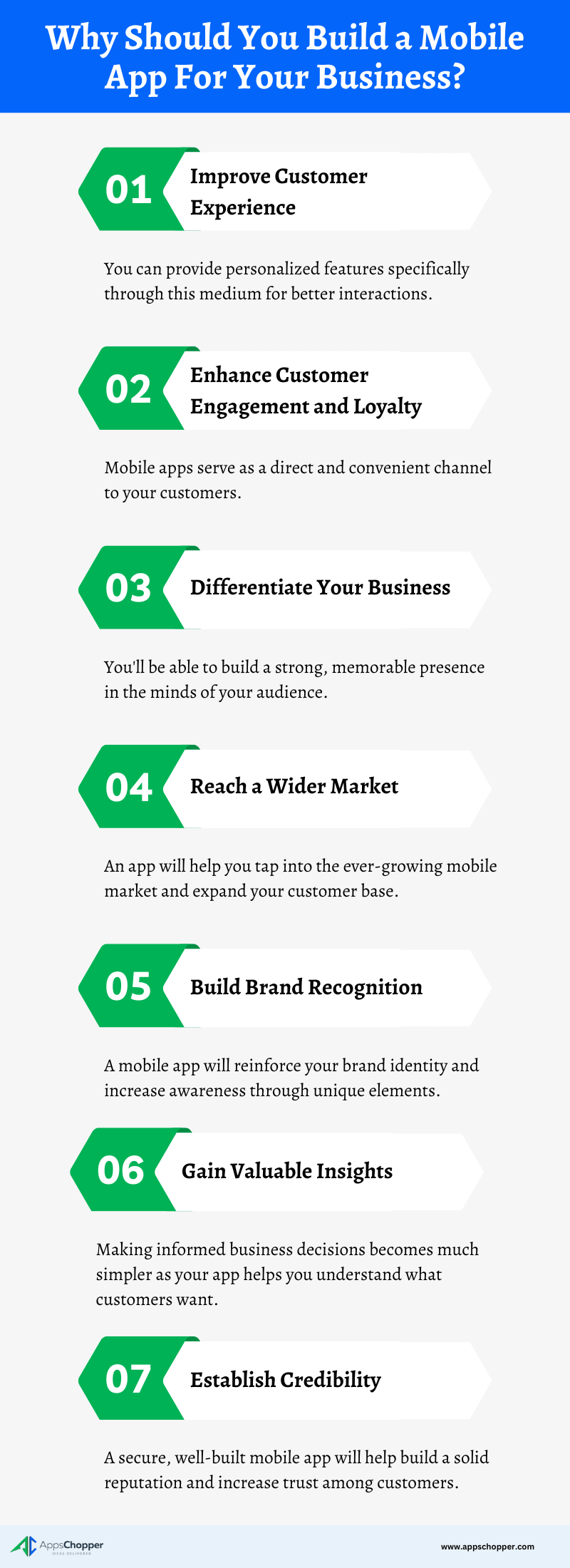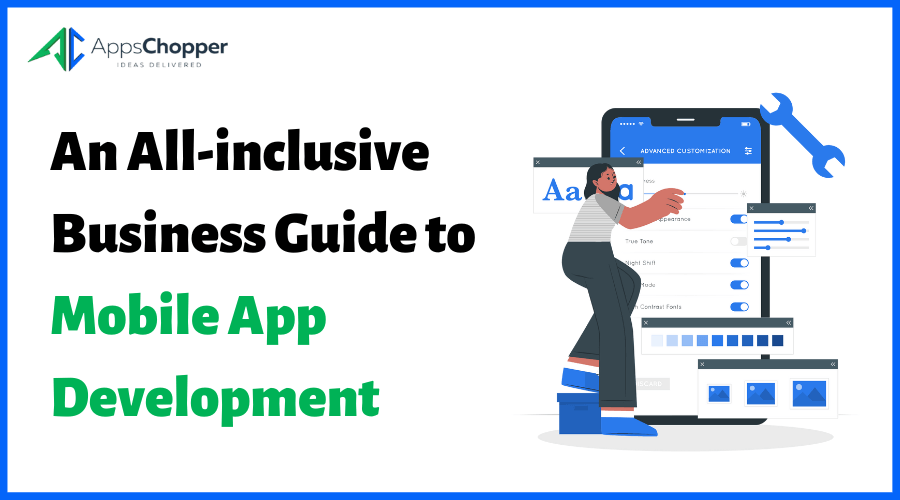Table of Contents
The advent of smartphones has changed how we interact with the world. Mobile apps are taking over all the major things in our lives, like communication, entertainment, shopping, gaming, and more.
There were 6.05 billion smartphone users in 2020 and this number will exceed 7 billion in 2024. In other words, it will take less than five years for users to grow by a billion.
The reason behind such rapidly-growing numbers is simple: mobile apps have made life easier for everyone. As a result, the mobile app market offers excellent potential for businesses to expand their reach and revenue.
As a business owner, you won’t want to miss the opportunity to reach out to so many customers. However, building a mobile app is a complex process that requires careful research and planning for proper execution.
What Is Mobile App Development?
Technically speaking, mobile app development is a process of coding software that runs on smartphones, tablets, wearables, etc. It is a strategic process to create an appealing mobile product by:
- Defining app objectives and exploring market potential
- Designing the layout and creating wireframes for an idea of how it should operate
- Building the app and incorporating necessary features
- Testing the app to ensure everything works as intended
- Launching the app and ensuring visibility across target audiences
Since mobile app development includes software development based on mobile devices, it tries to take complete advantage of the device’s exclusive features.
Why Build Mobile Apps?

If these stats aren’t enough, here are top reasons why you’ll want to consider creating a mobile app for your business:
- Boost Brand Awareness – Mobile apps can create higher visibility and recognition for your business. The more customers know your app, the more likely they will recognize it and your business. Therefore, you should ensure your app is user-friendly, responsive, and engaging.
- Increase Customer Engagement – Your business should invest in mobile app development to seamlessly connect and interact with customers, thus making it a valuable tool for modern businesses.
- Enhance User-Experience – A mobile app developed with diligence can help you connect with your customers where they need you most. Building a user-friendly mobile app improves customers’ experience.
- Improve and Increase Sales – With mobile apps delivering three-times more conversions compared to other portals, a mobile app can increase your customer base, boost your sales of products/services, and lead to greater profits.
- Viable Marketing Tool – Mobile apps are considered one of today’s best marketing tools. They help your business connect with a higher percentage of your target audience by integrating social media, push notifications, and various other features.
What Are the Different Types of Mobile App Development?
Mobile app development is not limited to Android & iOS development. PWAs are quickly gaining popularity due to their ability to run on multiple platforms using a single codebase.
- Android App Development – Android apps have a massive customer base and dominate the mobile app industry, with over 3.5 million apps in the Google Play Store. It is, therefore, always the primary choice for developing mobile apps for any business.
- iOS App Development – Businesses choose to develop iOS apps not only to reach Apple users, but also when security is their foremost concern. Due to its great potential for business, iOS apps typically focus on enterprises, particularly targeting countries with better economies and a larger iOS user base, like the US.
- Progressive Web Apps (PWAs) – Progressive Web App (PWA) is newer and is considered the future of app development. It combines the functions of both web apps and native mobile apps to develop Progressive Web Apps.
There are different platforms, as well, requiring segmented mobile app development services. These include native, cross-platform, and hybrid apps.
Which Is Better: Native, Hybrid, or Web-Based Apps?
There are three main types of mobile apps available to explore mobile app development: native, hybrid, and web-based. All three approaches hold inherent value, but which one is the right approach for your mobile app development project? Let’s jump right in to know.
Native Approach
Native mobile apps are considered the most common type of app, built for specific platforms, and written in specific languages based on the platform. Objective-C and Swift are used for apps to develop on iOS, whereas Java and Kotlin are used for Android apps. Both Apple and Google developers have their development tools, interface elements, and SDK.
Advantages of Native Apps:
- Native apps offer better performance in comparison.
- They are interactive, intuitive, and run more smoothly.
- These provide a superior user experience compared to other apps.
- Native apps receive complete support from app stores and app marketplace.
- Developers can access the full feature set of selected OS when building a native app.
Disadvantages of Native Apps:
- These require the use of more difficult programming languages than others.
- Expenses are the most costly upfront for native apps.
- They may not be the ideal choice for simple applications.
Hybrid Approach
Hybrid apps are a combination of native and web apps. They work across multiple platforms and behave almost like native apps. Hybrid apps are mainly built with HTML, CSS, JavaScript, or other programming languages and run in a web view. Hybrid app development incorporates additional native features to make it more functional.
Advantages of Hybrid Apps:
- Unlike web apps, hybrid apps don’t need a web browser.
- These apps deliver a seamless user experience.
- They are designed to run on a single codebase.
- Hybrid apps give access to a device’s internal APIs to store information offline.
Disadvantages of Hybrid Apps:
- They are slower in performance compared to native apps.
- They depend on a third-party platform to deploy the app’s wrapper.
- Customization requires investing more money, which could get expensive.
Web-Based Approach
Web-based apps, also known as Progressive Web Apps (PWAs), are hybrids of regular web pages and native apps. Being an emerging trend in mobile app development, PWAs can leverage features similar to native apps like push notifications, device hardware accessibility, improved touch gestures, and more.
Advantages of Web Apps:
- PWAs use a common code base across multiple mobile platforms.
- They are less expensive compared to native apps.
- Unlike other approaches, web-based apps don’t require approval from the app market.
- There is no need to update these apps from app stores.
- Web-based apps are easy to maintain.
Disadvantages of Web Apps:
- They aren’t as feature rich compared to others.
- Web-based apps complicate the user experience as they require more steps to use.
- These have poor discoverability if not marketed well.
- They are slower and less responsive than native apps.
- Web-based apps are less interactive and intuitive compared to native apps.
How to Build a Successful Mobile App
Developing a fully-functioning mobile app involves a systematic approach. Knowing the essential steps involved in building one can keep you ahead of the competition. Here are the seven essential steps of mobile app development:
- Step 1: Market Research – Market research mainly involves market/sector-domain data analysis that helps you find out user preferences and capital movement by observing what’s working in the market, and what’s not. All these things will help you determine how to make your app better than the rest.
- Step 2: Define App Goals – Once you’re done with the research phase, it is time to focus on the objectives of the app. Understanding the purpose behind building the app is crucial if you want it to succeed.
- Step 3: Designing the App – Designing your app is another significant element responsible for making your app successful. Mobile apps built with good design automatically attract zillions of potential users. UX/UI design, advanced features, multi-touch gestures, and more are some main components of the designing phase.
- Step 4: Select the Right Approach – You must’ve sorted out everything related to your next mobile app development, yet selecting the right approach for developing a mobile app can be daunting. You can choose your approach based on your audience, time, and budget.
- Step 5: Develop Your App – Once you are sure about your approach to developing an app, you should take a step forward and get in touch with a professional app development company with experience in your domain.
- Step 6: Test Your App – You must’ve put everything into developing your app, but what if your users find glitches while using your app? That would leave a bad impression on them. Thus, before making it live for your potential users, you should test the app concept in numerous real-world scenarios to ensure it functions properly.
- Step 7: Maintenance and Support – Your work is not done once your app is developed. It will require timely updates, maintenance and support. You’ll need reliable app maintenance and support services to keep your mobile app updated and glitch-free.
How Much Does It Cost to Build an App?
With an ever-increasing demand for mobile apps, mobile app development shows no sign of stopping at all. Many businesses want to create mobile apps to engage with more customers but are concerned about the costs. Here, we have categorized the approx cost of mobile app development with regard to complexity:
Simple Apps
As the name suggests, simple apps don’t contain many complex features and are simple. They don’t require API integration, back-end, standard UI components, etc. Simple apps include features like email subscriptions, social media logins, calendars, and others.
Due to the absence of complex features, simple apps cost around $20,000 – $40,000 and take approximately 400 hours to build.
Apps With Moderate Complexity
Unlike simple apps, moderate apps do include more features, but not as many as complex apps. These apps demand custom UI features, payment features, API integration, headsets and tablets adaptation, back-end server, and more.
Being moderate, these types of apps cost you somewhere between $40,000 – $80,000 and might take around 500-800 hours to develop.
Apps With Sophisticated Functionalities
Apps with advanced features are considered to be more time-consuming apps compared to others. These apps include multi-language support, third-party integrations, custom animations, complicated back-end, professional design, real-time features, and more.
Being more complex than others, these apps cost around $75,000 – $150,000 and might take around 800-1500 hours or more to complete.
Deploy Future-ready Mobile App Development Services With AppsChopper
Developing a mobile app that attracts massive users is not a secret – all it takes is steady effort and consideration. The AppsChopper team understands a mobile app is built for users, so mobile app development should always be user-centric. Our vast portfolio speaks volumes of our experience in translating our clients’ business objectives into apps, and we’re ready to help you do the same.
We would love to hear your comments relating to the post. Got some other thoughts? Drop us words through our contact page.
FAQ’s
- How soon can I launch my app? How long will development take?
It depends on certain factors, like how complex your app is and what features we’ll add. Basic-functionality apps take 3-6 months. More complex apps will take longer, so send us your requirements for a more accurate estimate.
- Which platform should I choose for my app, iOS or Android?
The choice largely depends on your business objectives and target audience. You can even opt for both if maximum market reach is your goal.
- Will my mobile app be sufficiently secure?
Making sure your team follows industry best practices and staying updated on security trends and vulnerabilities will help you maintain a secure app. You can take several measures, such as user authentication, encryption, secure APIs/server-side technologies, security patches, and thorough security testing throughout development.
- What are the ongoing maintenance costs for a mobile app?
Ongoing maintenance includes common tasks like bug fixes, performance optimizations, compatibility updates with new OS versions, security enhancements, and feature updates based on user feedback.








